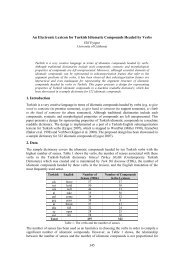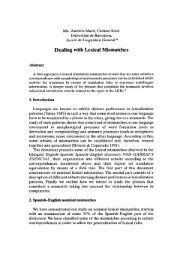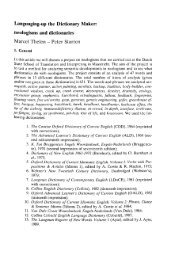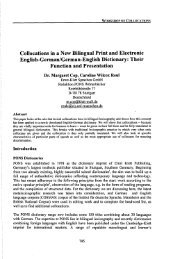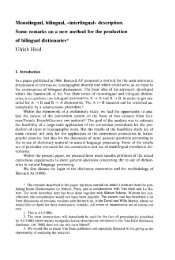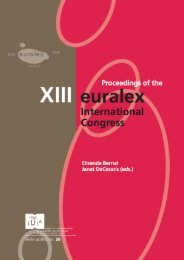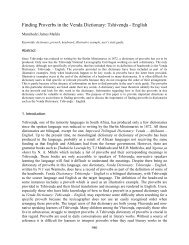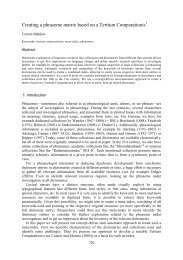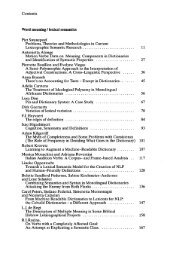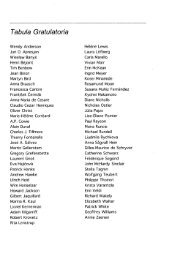Download pdf - Euralex
Download pdf - Euralex
Download pdf - Euralex
Create successful ePaper yourself
Turn your PDF publications into a flip-book with our unique Google optimized e-Paper software.
A Comparison Between COBUILD, LDOCE5 and CALD3: Efficacy<br />
and Effectiveness of the Dictionaries for Language Comprehension and<br />
Production 1<br />
Alice Yin Wa Chan<br />
Keywords: Language Comprehension and Production, Dictionary Use, Comparisons of Monolingual Dictionaries.<br />
Abstract<br />
This paper reports on the results of a research study which compared the effectiveness of different monolingual<br />
dictionaries for language comprehension and production by advanced Cantonese ESL learners in Hong Kong. A<br />
group of 31 students majoring in English participated in the study. This included a meaning determination task which<br />
required students to use a dictionary to determine the meanings of nine familiar words used in unfamiliar contexts, a<br />
sentence completion task which required students to use a dictionary to complete ten English sentences based on<br />
some given Chinese contexts, as well as a sentence construction task which required students to use a dictionary to<br />
construct ten English sentences using some given English prompts. Different monolingual dictionaries were used in<br />
the tasks by different sub-groups of participants, namely Collins COBUILD Advanced Dictionary 6 th edition<br />
(COBUILD6)/ Collins COBUILD Learner’s Dictionary Concise Edition (COBUILD Concise), Longman Dictionary of<br />
Contemporary English 5 th edition (LDOCE5), and Cambridge Advanced Learner’s Dictionary 3 rd edition (CALD3).<br />
The accuracy rates at which the participants performed the tasks were calculated, and their perception of the<br />
usefulness of the dictionaries was collected. It was found that monolingual dictionaries are effectiveness not just for<br />
language comprehension but also for language production, yet successful dictionary consultation does not depend on<br />
the dictionary being used. Learners’ dictionary skills and their abilities to extract relevant information from a<br />
dictionary are more important than the choice of dictionaries.<br />
1. Introduction<br />
Dictionaries are indispensable self-learning tools. Much effort has been put into the design and<br />
improvement of dictionaries for English as Second Language (ESL) learners (Chan 2011).<br />
Although a number of dictionaries are available for learners at different levels and for different<br />
learning purposes, very often learners ignore or misread the most informative elements of an entry<br />
(Nesi and Meara 1994). Many problems in learners’ dictionary skills have been identified, such as<br />
their difficulties in understanding the symbols and abbreviations used, their failure to interpret<br />
examples accurately, and their excessive reliance on inappropriate examples (Chan 2005). A lack<br />
of understanding of how dictionary information relates to the word learners are looking up is also<br />
one major problem (Nesi and Meara 1994). Although it is true that learner’s deficient dictionary<br />
skills may be the major cause of dictionary consultation problems, the effectiveness and<br />
comprehensiveness of dictionary information may also be at issue.<br />
2. Objectives<br />
The study aimed at comparing and contrasting the efficacy and effectiveness of different<br />
monolingual dictionaries for helping ESL learners comprehend and produce target English<br />
sentences.<br />
606
3. Participants<br />
Thirty-one participants participated in the study, including eight males and twenty-three females.<br />
They were all English majors at a local university. Their ages ranged from twenty to twenty-four at<br />
the time of the study: one year 1 student, eleven year 2 students, and nineteen year 3 students.<br />
Twenty of them had learnt English for fifteen to nineteen years and eleven had learnt English for<br />
twenty years or above.<br />
4. Procedures<br />
The students participated in three dictionary consultation tasks, including a meaning<br />
determination task which required students to use a dictionary to determine the meanings of nine<br />
familiar words used in unfamiliar contexts, a sentence completion task which required students to<br />
use a dictionary to complete ten English sentences based on some given Chinese contexts, as well<br />
as a sentence construction task which required students to use a dictionary to construct ten<br />
English sentences using some given English prompts. In each task, the participants were divided<br />
into three groups, with each group using a different monolingual dictionary and doing a different<br />
self-reporting protocol, namely introspective written questionnaires, retrospective written<br />
questionnaires, and think-aloud verbal recordings. The monolingual dictionaries used in the tasks<br />
included Collins COBUILD Advanced Dictionary 6 th edition (COBUILD6)/ Collins COBUILD<br />
Learner’s Dictionary Concise Edition (COBUILD Concise), Longman Dictionary of<br />
Contemporary English 5 th edition (LDOCE5), and Cambridge Advanced Learner’s Dictionary 3 rd<br />
edition (CALD3). The groupings of the participants in the three tasks were done in a way that all<br />
students had a chance to use all the different dictionaries and to be engaged in all the three<br />
different self-reporting protocols. The numbers of participants using a certain dictionary in a<br />
certain task were comparable (about ten to eleven in each group)<br />
For the Meaning Determination Task, the participants were given a total of nine sentences<br />
and asked to determine the most appropriate meaning of the italicized expression in each<br />
sentence with the use of a dictionary by circling the correct answer from a list of five choices. For<br />
each sentence, the target lexical item for dictionary consultation was also underlined. For the<br />
Sentence Completion task, a sentence context was invented and given in written Chinese for a<br />
total of ten target words. The target English words and some parts of the corresponding English<br />
sentences were also given. The participants had to complete the sentences with the help of a<br />
monolingual dictionary. For the Sentence Construction task, three to four prompts, one of which<br />
being a target word, were given to the participants for a total of ten target words. They had to use<br />
the given prompts to construct a grammatical and meaningful English sentence with the help of a<br />
monolingual dictionary, making whatever changes to the prompts deemed necessary but<br />
following the order of the prompts (see Appendix for some sample sentences used).<br />
5. Self-Reporting Protocols<br />
The Introspective Questionnaires aimed at soliciting the participants’ instant and detailed feedback<br />
on the way a certain dictionary entry helped them in making a decision. Of relevance to the<br />
objectives of the present study were forced-choice questions requiring the participants to report on<br />
their feelings when they ended a search, as well as open-ended questions requiring the<br />
607
participants to write out the information they used to make a final decision and the ways in which<br />
such information showed that their decisions were correct, to account for the reasons why they<br />
were doubtful about their decisions, and to report on the difficulties, if any, they encountered. All<br />
the questions were given in written English and all the participants responded in written English.<br />
The participants in the Think-aloud group were instructed to record the whole of their<br />
decision-making processes during dictionary consultation using whatever language they were<br />
comfortable with in a sound-proof room. The whole process of searching for the appropriate<br />
examples and/or definitions, deciding on the appropriate examples and/or definitions, and making<br />
decisions on the correct meanings or usage of the target words, was recorded.<br />
The Retrospective Questionnaires completed immediately after the participants had finished<br />
one whole task aimed at investigating their general evaluation of the usefulness of the dictionary or<br />
its different parts and other information not relevant to the scope of the present study. All the<br />
questions were given in written English and all the participants responded in written English.<br />
6. Target Words<br />
Different words were targeted in the different dictionary consultation tasks. For the Meaning<br />
Determination Task, all the words included were simple words familiar to advanced ESL learners<br />
rather than new or exotic words, such as occur, charge, but they all had (subtly) different<br />
meanings when used in different grammatical contexts. The grammatical contexts appearing in the<br />
given sentences were largely contexts less familiar to Hong Kong ESL learners.<br />
For the Sentence Completion Task, the target words included were also simple English<br />
words familiar to advanced ESL learners, but the uses of the words necessitated by the Chinese<br />
contexts were again mostly unfamiliar to Hong Kong ESL learners or often misused. To ensure<br />
that the completed English sentences matched the Chinese contexts, the participants had to use<br />
the target words correctly with appropriate grammatical associations, such as the correct choice<br />
of prepositions, the correct choice of phrasal verb particles, or verb complementation, etc.<br />
For the Sentence Construction Task, the target words included were often misused by<br />
Hong Kong Cantonese ESL learners (Bunton 1989, 1994, Heaton and Turton 1987, Jenkins<br />
1990). The grammatical patterns focused on included the choice of prepositions for a certain<br />
target noun (e.g. knowledge of), or the use of a target verb in a certain transitivity pattern (e.g.<br />
befriend).<br />
7. Data Analysis<br />
The participants’ performance in the various dictionary consultation tasks, as well as their reports<br />
in the written and verbal self-reporting protocols, was analyzed to uncover the effectiveness of<br />
the various dictionaries used. For the dictionary consultation tasks, the accuracy rates at which<br />
the students accomplished the tasks using a certain dictionary were calculated. For the written<br />
and verbal self-reporting protocols, the participants’ explicit reference to the dictionary’s special<br />
features, such as boldface, capitals, symbols, etc., as well as their explicit complaints about the<br />
lack of certain information in a dictionary, and their subjective opinions of the overall usefulness<br />
of the dictionaries, were also analyzed and compared.<br />
608
8. Results<br />
The accuracy rates at which the participants accomplished the dictionary consultation tasks using<br />
the different dictionaries were comparable, with an overall accuracy rate of 72.3% for all the<br />
three tasks for CALD3, an overall accuracy rate of 71.2% for COBUILD and an overall accuracy<br />
rate of 71.8% for LDOCE5. When individual tasks were analyzed, the accuracy rates were also<br />
comparable: For the Meaning Determination Task, the accuracy rates for CALD3, COBUILD<br />
and LDOCE5 were 64.4%, 65.7%, and 50.5%, for the Sentence Completion Task, the accuracy<br />
rates were 74.5%, 73%, and 79%, and for the Sentence Construction Task, the accuracy rates<br />
were 76.4%, 75% and 84.5% respectively. Despite these comparable figures, a number of<br />
participants (a total of four) using LDOCE5 achieved a very low accuracy rate of 40% or below.<br />
This pattern was not found in the performance of any participants using the other two dictionaries.<br />
The majority of the participants relied on and made explicit reference to the definitions<br />
and examples in the dictionaries for completing the language comprehension and production<br />
tasks. Although different special features (e.g. bold, capitals, special symbols) were used in the<br />
different dictionaries, only a minority of these features were made explicit reference to in the<br />
participants’ dictionary consultations. A detailed analysis of the introspective written<br />
questionnaires and the think-aloud verbal reports revealed that only 1.5% of the dictionary<br />
consultations made reference to the use of boldface in CALD3, 2.5 % to that in COBUILD, and<br />
11.9% to that in LDOCE5. 8% of the consultations made reference to the use of capitals in<br />
CALD3, 0% to that in COBUILD, and 1% to that in LDOCE5. 0% of the consultations made<br />
reference to the use of special symbols in CADL3 and COBUILD, whereas 5.5% made reference<br />
to that in LDOCE5.<br />
Examples of reference making to boldface included reports such as “Just now the second phrasal<br />
verb frighten away are in bold (Sentence Completion, dictionary used: LDOCE5)”, examples of<br />
reference making to capitals included the words in capitals given by different participants in<br />
explaining the information which led them to the decisions, and examples of reference making to<br />
special symbols included reports such as “ (caution) Do not say that something ‘comprise of’<br />
things or people. (Sentence Construction, dictionary used: LDOCE5).<br />
Also a minority of the participants were not satisfied with the information included in the<br />
different dictionaries and complained about the lack of information or their unclear presentations.<br />
0.5% of the dictionary consultations using CALD3, 2% using COBUILD and 0.5% using<br />
LDOCE5 included explicit verbal/written complaints by the participants. Examples of complaints<br />
included reports such as “Actually there is no example of this usage in the entry, I have to guess<br />
whether I should use of or for after monument in the task (Sentence Completion, dictionary used:<br />
COBUILD)”.<br />
Regarding the overall usefulness of the dictionaries used, 81.8%, 80% and 63.6% of the<br />
participants found CALD3, COBUILD and LDOCE5 extremely useful or very useful. While no<br />
participants regarded CALD3 and LDOCE5 not very useful or not useful at all, 20% of those<br />
using COBUILD had that feeling. 68.9% and 68% of the participants using CALD3 and<br />
COBUILD were sure that their decisions were correct, but a higher proportion of 83.6% of those<br />
using LDOCE5 were sure about their decisions.<br />
609
9. Discussion<br />
It can be seen from the above results that a monolingual dictionary is useful in helping learners<br />
determine word meanings and word usage, yet the successfulness of dictionary consultation does<br />
not depend on the dictionary being used. None of the three monolingual dictionaries used in the<br />
study, which are all popular monolingual dictionaries used in Hong Kong, is more or less<br />
effective than the others. Though learners’ dictionaries are more often used for meaning seeking<br />
purposes (Chan 2005), their effectiveness is not just limited to language comprehension but is<br />
equally effective for language production.<br />
Different special features, such as boldface, capitals and special symbols, are adopted by<br />
different dictionaries, yet explicit reference to such special features is very rare, if any, because<br />
learners rely mostly on the definitions and examples for helping them solve their learning<br />
problems. The clarity and comprehensiveness of dictionary definitions or examples are of greater<br />
concern to most learners and are much more frequently attended to, and learners’ dictionary skills<br />
and their abilities to extract relevant information from dictionary examples and definitions are<br />
more important than the choice of dictionaries. Lexicographers are suggested to enrich their<br />
inventory of examples and definitions to enhance the effectiveness of their dictionaries. Relevant<br />
explicit grammatical information should be given emphasis, and more eye-catching special<br />
features or highlighting techniques should be used to attract users’ attention. A general guideline<br />
for lexicographers is that dictionary compilation should be user-sensitive and guided by learneroriented<br />
empirical research.<br />
10. Conclusion<br />
This paper has reported on the results of a research study which investigated the effectiveness of<br />
CALD3, COBUILD and LDOCE5 for helping advanced Cantonese ESL learners determine word<br />
meanings and word usage. It is found that the successfulness of dictionary consultation is not<br />
contingent on the choice of dictionaries. Despite possible differences in the inclusion and<br />
presentation of information, learners find the different dictionaries equally useful. Further<br />
research is needed to investigate the use of monolingual dictionaries by learners of other<br />
linguistic backgrounds, such as those at a lower English proficiency level. It may also be<br />
enlightening to conduct research studies which compare the effectiveness of bilingualized<br />
dictionaries (Hartmann and James 1998) and monolingual dictionaries for language<br />
comprehension and production, as bilingualized dictionaries contain examples and definitions in<br />
the source language (i.e. learners’ mother tongue) and may be beneficial or detrimental to<br />
learners’ learning process.<br />
Note<br />
1 The work described in this article was fully supported by City University of Hong Kong (CityU Strategic Research<br />
Grant Number: 7008005). The support of the university is acknowledged. I would also like to thank all the<br />
respondents of the survey for their participation and my research assistant for her administrative help.<br />
610
References<br />
A. Dictionaries<br />
Cambridge Advanced Learner’s Dictionary. (Third Edition.) 2008. Cambridge: Cambridge<br />
University Press.<br />
Collins COBUILD Learner’s Dictionary. (Concise Edition.) 2003. Glasgow: HarperCollins<br />
Publishers.<br />
Collins COBUILD Advanced Dictionary. (Sixth Edition.) 2009. Boston, MA: Heinle Cengage<br />
Learning.<br />
Mayor, M. (ed.) 2009. Longman Dictionary of Contemporary English. (Fifth Edition.) Harlow,<br />
England: Pearson/Longman.<br />
B. Other literature<br />
Bunton, D. 1989. Common English Errors in Hong Kong. Hong Kong: Longman.<br />
Bunton, D. 1994. Common Social English Errors in Hong Kong: a Guide to Polite English.<br />
Hong Kong: Longman.<br />
Chan, A.Y.W. 2005. ‘Tactics Employed and Problems Encountered by University English<br />
Majors in Hong Kong in Using a Dictionary.’ Applied Language Learning 15.1&2: 1–28.<br />
Chan, A.Y.W. 2011. ‘Bilingualized or Monolingual dictionaries? Preferences and Practices of<br />
Advanced ESL Learners in Hong Kong.’ Language, Culture and Curriculum 24.1: 1–21.<br />
Hartmann, R.R.K. and G. James 1998. Dictionary of Lexicography. (First Edition.) London,<br />
New York: Routledge.<br />
Heaton, J.B. and N.D. Turton 1987. Longman Dictionary of Common Errors. Essex: Longman.<br />
Jenkins, G. 1990. English Problem Words. Hong Kong: The Commercial Press.<br />
Nesi, H. and Meara, P. 1994. ‘Patterns of Misinterpretation in the Productive Use of EFL<br />
Dictionary Definitions.’ System 22.1: 1–15.<br />
Appendix<br />
Sample Sentences Used in the Dictionary Consultation Tasks<br />
Meaning Determination Task (Target words underlined)<br />
1. The minister is alive to the responsibility of his position.<br />
A. is not dead to<br />
B. is happy about<br />
C. continues to take<br />
D. realizes<br />
E. I don’t know.<br />
2. It didn’t occur to him that his wife had an affair.<br />
A. come into his mind.<br />
B. surprise him<br />
C. happen.<br />
D. appear to him.<br />
E. I don’t know.<br />
611
Sentence Completion Task (Target words given in brackets)<br />
1. 我不想草率下決定.<br />
(rush): I don’t want to ______rush into________________________ a decision.<br />
2. 警方會控告他謀殺.<br />
(charge): The police will _____charge him with____________________ murder.<br />
Sentence Construction Task (target words underlined)<br />
1. (little) (knowledge) (linguistics)<br />
2. (what) (reason) (reject) (proposal)?<br />
612



